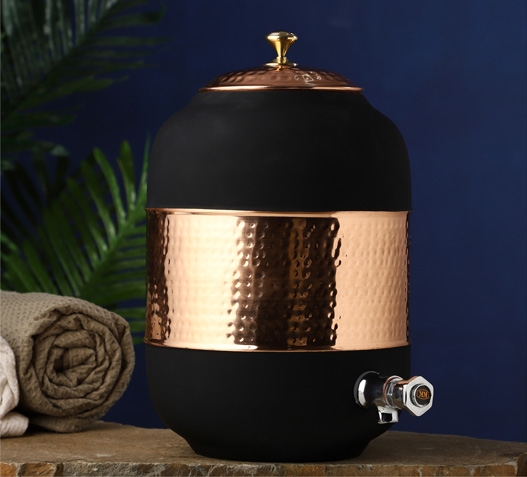Leading Trends in Home Decoration Featuring Trendy and Functional Copper Products
Leading Trends in Home Decoration Featuring Trendy and Functional Copper Products
Blog Article
Checking Out the Diverse Applications of Copper Products in Modern Industries
From improving the effectiveness of electrical systems to playing a critical role in eco-friendly power innovations, the versatility of copper is obvious. As sectors progressively focus on technology and sustainability, the diverse applications of copper call for a closer examination, particularly concerning their potential effect on future technical advancements and environmental practices.
Electric Applications of Copper
Copper is an important product in the electric sector, representing roughly 60% of the overall need for non-ferrous steels globally - Copper Products. Its exceptional electric conductivity, which is almost twice that of light weight aluminum, makes it the recommended selection for a variety of electrical applications. From wiring systems in business and residential buildings to high-voltage power transmission lines, copper ensures efficiency and integrity in electricity delivery
Along with wiring, copper is essential to the production of electric parts such as transformers, generators, and electric motors. These elements take advantage of copper's thermal conductivity and pliability, important for heat dissipation and effective performance. Furthermore, copper's resistance to rust boosts the life expectancy and toughness of electric systems, making it an economical option in the long term.
The development of renewable resource resources, such as solar and wind power, has further enhanced the need for copper in electrical applications. As sectors shift in the direction of sustainable energy solutions, copper's function becomes much more essential. On the whole, the adaptability and performance attributes of copper solidify its standing as a cornerstone product within the electrical field, driving development and performance across numerous applications.
Plumbing and Piping Solutions
In modern-day plumbing systems, the selection of materials substantially impacts both capability and longevity. Copper has actually become a favored alternative due to its one-of-a-kind properties, including rust resistance and antimicrobial qualities. These qualities make certain that copper piping stays risk-free and resilient for moving potable water, a critical factor to consider in domestic and business applications.
Among the essential advantages of copper in pipes is its capacity to endure high temperatures and stress, making it appropriate for a selection of applications, from warm water systems to heating and cooling networks. Furthermore, copper's flexibility permits less complicated installation in complex piping layouts, lowering the risk of failures and leaks.
Another noteworthy advantage is copper's lengthy life expectancy, usually going beyond half a century with appropriate maintenance. This longevity not only minimizes substitute prices yet also adds to lasting practices by lowering waste. In addition, copper's recyclability lines up with modern-day environmental criteria, advertising a round economy within the plumbing industry.
Copper in Renewable Energy
The adaptability of copper extends past plumbing applications, playing an important duty in the sustainable power industry. In solar panels, copper is made use of in photovoltaic or pv cells and circuitry, assisting in reliable energy conversion and transmission.

In addition, as the international need for electrical cars (EVs) boosts, copper's role in battery systems and charging infrastructure becomes much more significant. The material's capacity to perform power efficiently is integral to the efficiency of EV batteries, boosting variety and charging speed.
Copper's Function in Electronics
Electronics manufacturing counts greatly on copper's remarkable properties, particularly its high electric conductivity and thermal effectiveness. These qualities make copper a perfect choice for a vast array of electronic components, consisting of ports, circuit boards, and electrical wiring. The steel's ability to successfully transfer electrical signals makes certain very little energy loss, a knockout post which is crucial in high-performance digital gadgets.
Moreover, copper's thermal conductivity plays a substantial duty in warmth dissipation, securing sensitive parts from overheating. This is especially vital in modern-day electronic devices, where compact layouts result in increased warm generation. Copper is also favored for its pliability and ductility, allowing it to be quickly shaped into elaborate layouts that satisfy the needs of advanced digital applications.
With the surge of consumer electronics, telecoms, and electrical vehicles, the need for copper in the electronic devices market proceeds to grow. Thus, copper stays a keystone product in the ever-expanding area of electronic devices.
Cutting-edge Makes Use Of in Manufacturing

One noteworthy application remains in additive manufacturing, where copper-based materials are employed in 3D printing processes. This permits for the development of complicated geometries and lightweight components, specifically in the aerospace and automotive sectors. Furthermore, copper's thermal conductivity makes it an optimal option for warm exchangers, enhancing performance in commercial air conditioning systems.
Moreover, the surge of wise production has actually seen the incorporation of copper in Full Article IoT devices, where its conductive abilities support sophisticated picking up innovations. In the world of renewable resource, copper is crucial in the production of photovoltaic panels and wind turbines, facilitating extra reliable power conversion and circulation.
As markets pursue sustainability and advancement, copper's convenience and efficiency proceed to place it as a critical product, driving improvements in production and adding to the development of smarter, more effective products.
Verdict
The indispensable role of copper in eco-friendly energy and its vital feature in electronics emphasize its relevance in advancing sustainable techniques. Jointly, these applications highlight copper's essential contribution to technical progression and industrial efficiency in contemporary culture.
From boosting the efficiency of electrical systems to playing a crucial function in sustainable power modern technologies, the adaptability of copper is evident. As markets progressively focus on innovation and sustainability, the diverse applications of copper require a closer evaluation, specifically concerning their possible effect on future technical improvements and ecological practices.
The development of eco-friendly energy sources, such as solar and wind power, has actually even more increased the need for copper in electrical applications. In general, the adaptability and efficiency features of copper solidify its standing as a foundation product within the electric field, driving development and efficiency throughout numerous applications.
The versatility of copper prolongs Read Full Article past plumbing applications, playing an essential duty in the renewable energy field.
Report this page